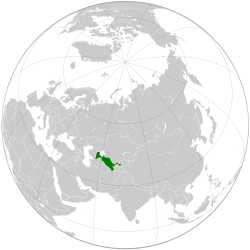උස්බෙකිස්තානය
Republic of Uzbekistan Oʻzbekiston Respublikasi (උස්බෙක්) | |
|---|---|
ජාතික ගීය: Oʻzbekiston Respublikasining Davlat Madhiyasi "State Anthem of the Republic of Uzbekistan" | |
 Location of Uzbekistan (green) | |
| අගනුවර සහ විශාලතම නගරය | Tashkent 41°19′N 69°16′E / 41.317°N 69.267°E |
| නිල භාෂා(ව) | Uzbek[1][2] |
| පිළිගත් ප්රාදේශීය භාෂාවන් | Karakalpak (in Karakalpakstan)[1] |
| ජනවාර්ගික කණ්ඩායම් (2021[3]) | |
| ආගම |
|
| ජාති නාම(ය) |
|
| රජය | Unitary constitutional presidential secular republic[5] |
| Shavkat Mirziyoyev | |
| Abdulla Aripov | |
| ව්යවස්ථාදායකය | Oliy Majlis |
| Senate | |
| Legislative Chamber | |
| Formation | |
• Uzbek SSR established after national delimitation | 27 October 1924 |
• Declared independence from the Soviet Union | 1 September 1991a |
• Formally recognised | 26 December 1991 |
| 2 March 1992 | |
• [[Constitution of
Uzbekistan|Current constitution]] | 8 December 1992 |
| වර්ග ප්රමාණය | |
• සම්පූර්ණ | 448,978 km2 (173,351 sq mi) (56th) |
• ජලය (%) | 4.9 |
| ජනගහණය | |
• 2022 ඇස්තමේන්තුව | 35,300,000[6][7] (41st) |
• ඝණත්වය | 74.1/km2 (191.9/sq mi) (128th) |
| දදේනි (ක්රශසා) | 2022 ඇස්තමේන්තුව |
• සම්පූර්ණ | $335.806 billion[8] (53rd) |
• ඒක පුද්ගල | $9,530[8] (154th) |
| දදේනි (නාමික) | 2022 ඇස්තමේන්තුව |
• සම්පූර්ණ | $73.060 billion[8] (78th) |
• ඒක පුද්ගල | $2,071[8] (171th) |
| ගිනි (2013) | මධ්යම · 88th |
| මාසද (2019) | 0.720[11] ඉහළ · 106th |
| ව්යවහාර මුදල | Uzbek som (UZS) |
| වේලා කලාපය | UTC+5 (UZT) |
| දින ආකෘති | dd/mm yyyyb |
| රිය ධාවන මං තීරුව | right |
| ඇමතුම් කේතය | +998 |
| ISO 3166 code | UZ |
| අන්තර්ජාල TLD | .uz |
වෙබ් අඩවිය gov.uz | |
| |
උස්බෙකිස්ථානය නිළ වශයෙන් උස්බෙකිස්ථාන් සමුහාණ්ඩුව මධ්යම ආසියාවේ පිහිටි රටකි. එය මායිම් වන්නේ බටහිරින් හා උතුරින් කසකස්ථානය, නැගෙනහිරින් කියර්ගිස්තානය හා නැගෙනහිරින් ටජිකිස්ථානය දකුණින් අෆ්ගනිස්ථානය හා ටර්ක්මෙනිස්ථානයටය. මුල් 16 වන ශතවර්ෂයේ දී නැගෙනහිර ටර්නින් භාෂාවන් කථා කල උස්බෙක් නොමෑඩ්වරුන් විසින් මෙම රාජ්ය අල්ලා ගත්හ. වර්තමානයේ උස්බෙකිස්ථාන ජනගහනය අයත් වන්නේ අස්බෙස් ජන වර්ගයට අනුව ඔවුන් එම භාෂාව කථා කරයි. 19 ශතවර්ෂයේ දී උස්බෙකිස්ථානය රුසියානු රාජ්යයට එක් කල අතර 1924 වර්ෂයේ දී සෝවියට් සංගමයේ ව්යවස්ථාදායක සමුහාණ්ඩුවක් බවට පත් විය. එය නිදහස් සමුහාණ්ඩුවක් ලෙස 1991 පටන් පවතී. උස්බෙකිස්ථානය ආර්ථිකය මුලික වශයෙන් වෙළඳ භාණ්ඩ වන කපු, රත්තරන්, යුරේනියම්, පොටැසියම් සහ ස්වභාවික වායු මත යැපේ. එය වෙළඳ ආර්ථිකයකට මාරුවීමට ද පරමාර්ථ කොටගෙන තිබේ. රට ස්ථාවර ආර්ථිකයන් රදා පවත්වා ගන්නට උත්සාහ දරන අතර ඒ නිසා විදේශ ආයෝජකයින් ද වළක්වා ගෙන ඇත. මෙම ක්රමයෙන් හා ස්ථිරව මාරුවිමට දරණ පනත අනුව 1995 පසු ආර්ථික වශයෙන් යහපත් ප්රතිචාර දක්වා නොමැත. උස්බෙකිස්ථානයේ පවතින මානව හිමිකම් පනත හා ඒක පුද්ගල නිදහස් අන්තර්ජාතික සමාගම්වල විවේචනයට භාජනය වී ඇත. එහි 45% කට ආසන්න ජනගහනයක් දිනකට ඇ. ඩො. 1.25 කට වඩා අඩුවෙන් උපයයි.
- ↑ 1.0 1.1 "Uzbekistan: Law "On Official Language"". Refworld.
- ↑ "Constitution of the Republic of Uzbekistan". constitution.uz. constitution.uz. සම්ප්රවේශය 1 September 2020.
- ↑ . The State Statistics Committee https://www.gazeta.uz/ru/2021/08/20/ethnic-groups/. සම්ප්රවේශය 26 August 2021.
{{cite web}}: Missing or empty|title=(help) - ↑ "Uzbekistan - The World Factbook". www.cia.gov. සම්ප්රවේශය 2021-05-08.
- ↑ "Bertelsmann Transformation Index 2006" (PDF). World Development Report 2006. The World Bank. 2006. සම්ප්රවේශය 3 January 2021.
The party system appears stable and moderate, characterized by moderate fragmentation, relatively high polarization, and moderate voter volatility. However, it is not socially rooted. All five registered parties strictly follow the government line. The Liberal Democratic Party of Uzbekistan (LDPU) is the dominant party. At the other end of the party spectrum, there are four opposition parties that have consistently been denied registration. Most of the officially registered cooperative associations and interest groups are part of authoritarian corporatist structures.
- ↑ "Demografiya va mehnat statistikasi (Yanvar - Dekabr, 2020)". Stat.uz. 20 January 2021.
- ↑ "Население Узбекистана превысило 35 миллионов)". Gazeta.uz (Russian බසින්). 2021-09-07.
{{cite web}}: CS1 maint: unrecognized language (link) - ↑ 8.0 8.1 8.2 8.3 Uzbekistan. International Monetary Fund
- ↑ "Income Gini coefficient | Human Development Reports". hdr.undp.org. 10 June 2010 දින පැවති මුල් පිටපත වෙතින් සංරක්ෂිත පිටපත. සම්ප්රවේශය 6 December 2017.
- ↑ "GINI index – Uzbekistan". MECOMeter – Macro Economy Meter. 4 April 2015 දින පැවති මුල් පිටපත වෙතින් සංරක්ෂිත පිටපත. සම්ප්රවේශය 6 December 2017.
- ↑ Human Development Report 2020 The Next Frontier: Human Development and the Anthropocene (PDF). United Nations Development Programme. 15 December 2020. pp. 343–346. ISBN 978-92-1-126442-5. සම්ප්රවේශය 16 December 2020.


